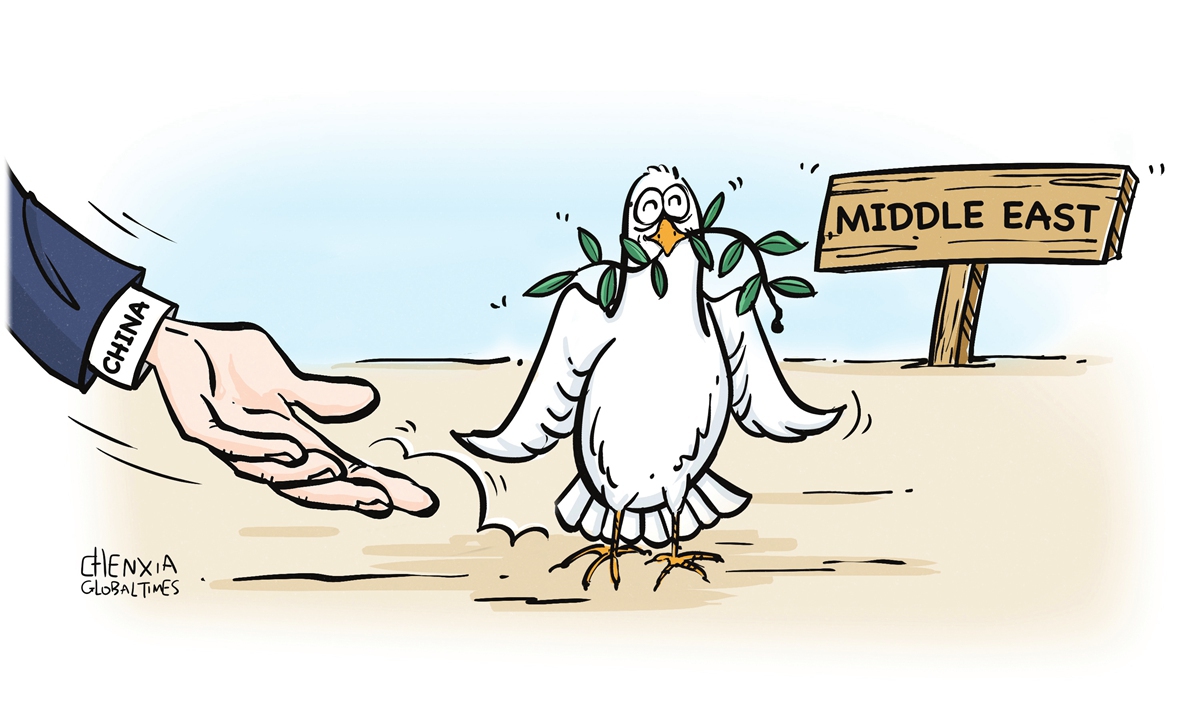
Illustration: Chen Xia/GT
The
mk news of the recent reconciliation talks in Beijing between the Palestinian National Liberation Movement (Fatah) and the Islamic Resistance Movement (Hamas) has drawn significant attention from both Western and Arab media. While the Chinese Ministry of Foreign Affairs has not directly confirmed the talks, it stated that China always supports Palestinian factions in achieving reconciliation and solidarity through dialogue and consultation and stands ready to provide platforms and opportunities for all Palestinian factions to carry out dialogue for reconciliation. Amid the ongoing Israel-Palestine conflict and Israel's airstrikes on Yemen last Saturday, which may escalate further, any political solution that helps end the bloodshed in the Middle East is valuable.
Saudi Arabia's Al Arabiya TV commented that regardless of the outcome, China's diplomatic move demonstrates a sense of responsibility, calling it "remarkable" and "admirable." China is not a party to the Israel-Palestine conflict, but the lives and safety of the Middle Eastern people - whether the humanitarian disaster in Gaza, the safety of Israeli hostages, or the conflicts spreading to neighboring countries and the Red Sea - always concern the Chinese people. Within the UN framework, China has been advocating for peace and mediating efforts for Israel-Palestine peace. In recent years, China has consistently stood for peace and dialogue in various international conflicts, showcasing its role as an international peace mediator. Now, with the prolonged Israel-Palestine conflict, the request from Palestinian factions for China's mediation reflects high recognition of China's diplomatic stance and mediation capabilities.
Meanwhile, some Western media have interpreted China's mediation between the two Palestinian factions as part of its "diplomatic ambitions," even suggesting that China aims to "replace the US in the Middle East." This interpretation is narrow and exaggerated, revealing a disregard for the sovereignty of Middle Eastern countries. The Middle East is not the domain of any major power, and the survival and development rights of the Israeli and Palestinian people should not be used as leverage in any geopolitical transactions. A Palestinian scholar once pointed out that compared to other parties, China's approach does not involve exerting pressure but rather creating a positive environment for dialogue, with the main goal of promoting a unified vision for Palestine. Instead of focusing on China, these Western commentators should reflect on why their own countries have failed to facilitate Palestinian reconciliation and why regional countries don't trust them.
The internal reconciliation of Palestine is a key step in achieving peace in the Middle East. Gradually unifying voices and actions through internal reconciliation will help promote the realization of the "two-state solution" and lay the foundation for regional peace and development. Complex territorial disputes, religious and ethnic conflicts, as well as frequent intervention by external forces have made the Middle East peace process a "problem of the century." The reconciliation process between Fatah and Hamas has also been long and tortuous. Along the way, through the mediation of all parties, the two factions have reached many agreements, but they have not been successfully implemented. It is widely believed that as the cease-fire agreement between Israel and Hamas in the Gaza Strip is progressing, discussions about future plans for the area have become more urgent, and any plan surrounding the postwar reconstruction of Gaza cannot be separated from the precondition of the reconciliation between Fatah and Hamas.
China's efforts in promoting the Middle East peace process are continuous and determined. China has always firmly supported the just cause of the Palestinian people to restore their legitimate national rights, and this is not the first time that China has provided a platform and created opportunities for Palestinian factions to carry out reconciliation dialogues. On April 30 this year, the Ministry of Foreign Affairs confirmed that at the invitation of China, representatives of Fatah and Hamas recently came to Beijing for in-depth and candid talks on promoting intra-Palestinian reconciliation, and achieved positive progress. This shows that the wave of reconciliation set off in the Middle East after Saudi Arabia and Iran agreed to fully restore diplomatic relations in Beijing last spring is still continuing. Beijing's unique diplomatic mediation model provides new ideas and positive energy for peace and stability in the Middle East.
Dialogue rather than confrontation, partnership rather than alliance, win-win rather than zero-sum game, China's Global Security Initiative has become a public good in the Middle East. On the issue of the Palestinian-Israeli conflict, China has always stood on the side of fairness and justice, emphasizing political settlement, immediate and lasting cease-fire, and saving innocent lives and mitigating humanitarian disasters. Stopping the bloodshed in the Middle East should be put before all geopolitical considerations - this is the real concern of China's diplomacy.

